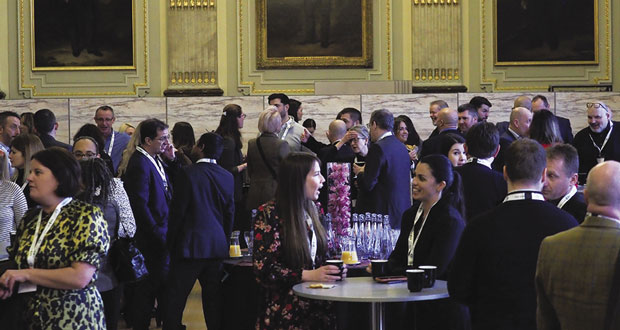Following a two-year hiatus, Workplace Futures 2022, deftly chaired by Martin Pickard, delivered a thoughtful, forward thinking agenda on how FM can help make all our lives better
As FM Consultant Lucy Jeynes remarked in her brief sum-up of the first live Workplace Futures event since early 2020, what wasn’t covered; Brexit, COVID and hybrid working was a clever move. Rather than dwelling on the events of the past two years the programme focused on the area of most critical importance to the sector, sustainability.
Yetunde Abdul, Head of Climate Action for the UK Green Building Council, began by briefing delegates on the UKGBC’s Whole Life Carbon Roadmap. This includes a range of actions aimed specifically at FMs on accessing, monitoring and implementing measures that help meet net zero carbon targets. She reflected there is more openness from organisations on their progress than previously, which is needed if we’re to hit the 2030 target.
Georgia Elliott-Smith, MD of sustainability at Element Four spelt out the main reason why all of us need to question how our goods and services are delivered. “There is no such thing as cheap”, she said, “somebody is paying the cost, so if you are getting something cheap ask yourself what is the actual cost?”
Aside from ethical motivations she welcomed the news that following the recommendations of the Task Force on Financial Disclosures (TFFD), large UK-registered companies will have to disclose climate-related financial data from April 2022. This move could soon mean that FM is more strategically important than ever for clients to help demonstrate their emission reduction plans and sustainability credentials.
SOCIAL VALUE
Sustainability goes hand in hand with societal impact said Guy Battle, CEO of the Social Value Portal who confirmed that social value is changing how we look at our buildings. The birthplace of Environmental, Social, Governance (ESG) was social value he said, with the former about minimising harm and the latter maximising impact. While he was pleased that the IWFM collaborated with the portal to launch the FM social value framework he warned that not enough FMs “quite get it yet” and haven’t grasped the opportunity for social value in benefitting their businesses.
One organisation that has embraced social value is Eric Wright FM, which as its MD George Lilley explained, pursues a ‘profit for purpose’ agenda, which ploughs money back into the Eric Wright Charitable foundation to support a range of charities. People want to make a difference, he said, and by engaging with employees you can help them make a positive contribution to their community.
Describing the benefits of addressing social value and diversity and inclusion in the workplace, Sophie Ransome and Kelly Dolphin of Atalian Servest said begin with an analysis of the makeup of the workforce to determine where improvements can be made. For Atalian Servest this resulted in a range of actions, including the launch of CHROMA, a diversity and inclusion (D&I) platform, which 78 per cent of colleagues agree has improved the firm’s diversity and inclusion approach.
GOING GREEN
There are many definitions of sustainability, Chris Havers, Programme Director at the Sustainable Facilities Management Index remarked, but ultimately, it’s about delivering an equilibrium between the delivery of services without negative impacts. There remains a lack of understanding of the impact of FM in the operational management of a building, he warned, which is why the sector needs to get involved more in the lifecycle discussions.
Reliable data is the key to measuring sustainable progress said Reid Cunningham of BAM FM. The biggest challenge is in reporting Scope 3 emissions, but it’s essential, when you consider that typically, between 60 and 90 per cent of an organisation’s green house emissions are estimated to be within scope 3.
Old arguments that net zero isn’t commercially viable is a misnomer as it’s essential for business said Matt Dracup of Mitie. Whether it’s about satisfying groups of stakeholders/investors or addressing the higher costs of energy, net zero plans are a reason to step back and look at ways of making your business leaner he said.
An area where societal and sustainable activities combine is food waste – and Claire Atkins Morris of Sodexo’s call to action was: “do you have a commitment to reduce food waste?” Food waste redistribution and sharing skills can make a difference to a community she said so are you monitoring or tracking food waste and are you enabling consumers to make an informed choice?
In his discussion on ensuring better employee engagement by building it into collaborate arrangements and employee contracts, Jeremy Campbell of EMCOR UK reminded delegates: “We employ some of the lowest paid people in any industry so if we’re not paying at least the living wage, shame on us.”
Rounding off the presentations, James Bradley the COO of Churchill Group considered the need for longer term thinking in ESG and discussed why FM has responsibility to help its clients achieve it. He concluded that facilities managers could provide benchmarks for achieving ESG.
The conference lived up to its promise to tackle the complexities of FM sustainability: be it social, environmental or commercial, but the main message of the day came from James Stander of Sustainable Advantage. Doing the right thing is good  business.
business.





